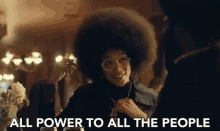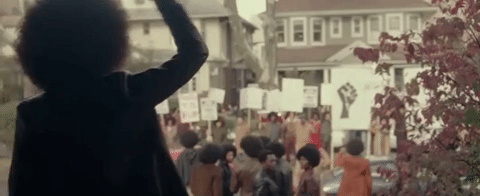A Safe Tale About the KKK (a review of BlacKKKlansman)
I have to start this review by disclosing a lot of things:
I woke up this morning with a bastardized version of the quote “For the master's tools will never dismantle the master's house” in my head.
I’ve never been a fan of Spike Lee. I respect him. I’m even grateful for him in some respects. But I’ve never been a fan.
One of my uncles is a police detective and I respect the work he’s done.
I spent my morning recording a funeral for a man in prison who was not allowed out for the few hours it would have taken to see his father one last time.
An overwhelming majority of my friends would describe themselves as “politically conscious”. Most are activists. A number were literally card carrying socialists before the latest news cycle made it fashionable.
Which is to say: your girl be bias but like, her bias is complex because we live in the gray, ya dig? Cool.
Everyone had a fro in this movie. There were no other styles for black folks in Colorado in 1970. None.
There’s this weird thing about critiquing Spike Lee that I have trouble with. For better or worse he is the most prominent black filmmaker of the modern era. Ever, if we are being real. Most people - black, white and otherwise - don’t know Ava DuVernay, Ryan Coogler, or John Singleton by name, let alone a director who has had less mainstream success. Everyone knows Spike Lee. He purposely made sure of that. And for both better and worse, that representation matters. He uses his platform to bring attention to black pain and pleasure. A lot of the success black filmmakers have now is due to that.
And yet....
And yet subtlety is not in his wheelhouse. And yet I have never trusted him to write a black woman well, that includes She’s Gotta Have It. And yet he could use a harsher editor more often than not. And yet, he hasn’t told me something I don’t know -that most of us don’t know- in quite a while, despite his posturing otherwise.
These are criticisms that are hard to talk about in mixed company because they tie so readily to his content. It’s easy for people who want to dismiss a difficult message to do so when you point out what didn’t work in the delivery. I truly want to avoid that.
I want another movie starring these two actors in a completely different situation.
However, my list of “and yet”s stand firm.
BlacKKKlansman is a dramatization about Ron Stallworth, the first black cop of Colorado Springs Police Department, who leads an undercover investigation into the local chapter of the KKK. It stars John David Washington as Ron and Adam Driver as Flip Zimmerman, the Jewish undercover detective playing this white version of Ron in real life. It opens with a recreation of a classic scene from Gone with the Wind and has scenes from Birth of a Nation [1] sprinkled in both immediately after and in a climactic scene.
If nothing else, I want to make sure I say that it is a good film. Just fine. Worth a matinee price if supporting mid-budget films is your thing. Worth a Redbox rental/Netflix watch if it isn't. Technically sound, well acted, with moments of both levity and real horror that are balanced well. Lee uses the previously mentioned films to draw his most deftly made point: that films can have the power to make a lasting impact. There’s an implied hope then that BlacKKKlansman can therefore also make a lasting impact on its audience. I believe it will for some folks.
But I know it won’t for those of us already doing the work.
My kingdom for a 50 year hiatus from wasted girlfriend characters.
Lee and his three co-writers don’t do enough to explore any of the ideas they present. We never get a real sense of who Ron is. The most we ever gleam is that he always wanted to be a cop. There’s no explanation of why, no sense of what being a cop means to him, no reason as to why he thinks this worth the danger he puts himself in. Maybe this plot point would have mattered less in a pre-police-brutality-caught-on-camera-phone world, but we are beyond that now. It’s hard to watch him submit to such abuse for seemingly no real end game. Perhaps he thinks he can dismantle the master’s house this way. For as blunt as Lee is, you would think he would have made that point crystal clear. Instead this idea is briefly floated as a defense to his girlfriend Patrice, the far more politically active woman he is lying to about being a cop. (We will definitely get back to Patrice). We actually end up getting more of an explanation about why Flip hides his Jewish background, which is a whole essay about passing I just do not have time to get into right now. It’s not much but it’s a significant enough scene for a supporting character.
But ok. So Ron is a cop for reasons. Whatever. What of the KKK then? There’s nothing we haven’t seen before. I’m grateful David Duke wasn’t depicted as a buffoon the audience could have written off with a laugh, but he isn’t given any weight outside of the klan. There are characters mentioned who do have political or social power outside of the klan, but they aren’t given lines so their danger isn’t given a chance to weigh on us. The rest of the klan is dangerous but really only as low grade terrorists. Not as people with day jobs in the real world. Like being a police officer for instance. The only characters given any range of emotions and quiet, meditative moments we are forced to sit with are Felix and his wife Connie (Jasper Pääkkönen and Ashlie Atkinson), the klan’s most volatile members. We see them excited, scared, proud, sad, hurt, energized and suspicious as the story unfolds and despite Lee’s board approach to this depiction, it generally works within the context of the film. Our hero Ron is given far less.
No snarky comment here. These were just well done exchanges.
Lee needs a jackass for an editor. Someone who will fight him back some scenes. The whole film feels as if there is a 3 ½ hour director’s cut coming our way soon. Some scenes last far too long, others start a minute too far in, like someone fast forwarded the story a bit too far and decided to just let it play anyway. The coda to this movie, a montage of the current Alt-right marches, the counter protests and an in memoriam for Heather Heyer [2] lasts far too long and could have easily made it’s point with a few words from the real David Duke praising Trump for his words regarding the Charlottesville’s rally.
Additionally, the ending itself is surprisingly pat as hell. Every bad guy gets his comeuppance in a modern fairy tale style. I’m willing to forgive this because sometimes we just need a happy ending. I also haven’t fact checked the film against what really happened yet. Who knows? Maybe this is what really happened. I doubt it, seeing as life literally never happens like that. But maybe it did. Regardless, I’m surprised Lee went with such a Hollywood resolution. Some of the endings could have been cut and the audience wouldn’t have known the difference. It also wouldn’t have provided a comfort to those who believe in a perfect karma for the “real” racists people in the world.
All I could think of here is that episode of Atlanta where Darius is at the shooting range.
For as disruptive and militant as Lee proclaims to be, as much as his carefully crafted persona would lead you to believe, this story is safe as hell. A safe tale about the KKK. The only character who pushes against the status quo, Patrice, is put in danger in part because of Ron’s actions. Her ideas are never explored or given true weight. They are merely respites between tense undercover scenes. She is the “girlfriend character” through and through, a significant disservice that doesn’t come as a surprise at all. When a member of the KKK get suspicious, it’s Flip-as-Ron who is the most danger. Ron never really questions if it is worth it, what the end game is or even what to do with this goldmine of information he’s unearthed. Flip is so cool under pressure he’s almost superhuman which is hard to relate to (and a waste because a mad or scared Adam Driver is fun to watch). And when the story is all over? Well, David Duke is still out here in these 2018 streets so we all knew how this story ends before it starts. Which is fine but means we need something more to take away from it. Drawing a direct line between then and now doesn’t challenge us because it’s common knowledge.
Exploring the gray areas would have though.
Lee's style of shot composition really worked though. I'm critiquing the hell out of this movie but it is, on the surface, a compentently made film.
I don’t know if I fully agree that you can’t use the master’s tools against him. I think it takes everything we have at our disposal to make real change. But I just looked up the full quote in to make sure I had it right and I certainly find myself agreeing with Audre Lorde in full context: “For the master’s tools will never dismantle the master’s house. They may allow us to temporarily beat him at his own game, but they will never enable us to bring about genuine change. Racism and homophobia are real conditions of all our lives in this place and time. I urge each one of us here to reach down into that deep place of knowledge inside herself and touch that terror and loathing of any difference that lives here. See whose face it wears. Then the personal as the political can begin to illuminate all our choices.”
Footnotes:
1. I suppose I make this point 6 in my bias list - I fucking hate that both of those movies are taught in film school. Birth of a Nation, the movie about how the heroic KKK defeated the terrorizing black people, is incorrectly seen as being the birth of most modern filmmaking techniques and correctly as the birth of the modern KKK. I spent four years learning about America’s first major blockbuster while praying the professor teaching the film wouldn’t be ballsy enough to make me sit through the whole thing. Fuck that movie. Fuck D.W. Griffith. Fuck Intolerance, the follow up film every professor wants to bring up to curb the conversation about how racist Birth of a Nation is because it was his “apology” film but no professor has ever deemed good enough to show clips from. Fuck him and the clique he claims. And fuck “not knowing nothing about birthing no babies”. I will dedicate every film award I ever win to the sacrifices Hattie McDaniel and Butterfly McQueen made for me
2. Ending the film with a memoriam to Heather Heyer felt very wrong. Not because Heyer doesn’t deserve recognition, far from it in fact. But because so many black people have been killed in the last few years in this fight against the Alt-Right/KKK v. 3.0 that it is jarring as hell to center a white woman at the end of this story about black liberation. To say I felt some type of way when I saw that is putting it far too mildly
Throw a tip in the jar for this ad free experience:
paypal: https://www.paypal.com/paypalme/WelcometoMidnight
cash app: $jazzyfilmmaker
venmo: @jasminefilm
Patreon.com/jasminegolphin






